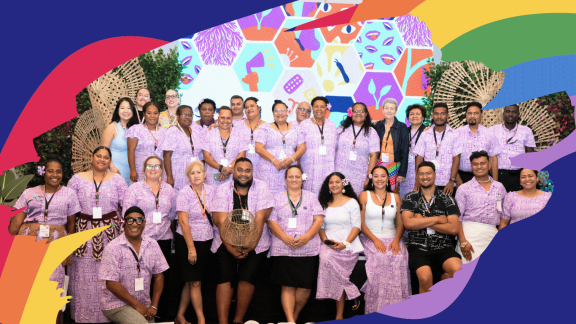Suva/Kuala Lumpur, 28 November 2024- Recent reports from across the Pacific highlight the increasing challenges faced by the LGBTIQA+ community, particularly in accessing essential sexual and reproductive health and rights (SRHR). Discriminatory attitudes, legal barriers, and harmful political rhetoric continue to exacerbate these issues, profoundly affecting health, well-being, and human rights in the region.
In Fiji, the rising rate of HIV cases among Itaukei men, particularly in rural areas, reflects the barriers preventing LGBTIQA+ individuals from accessing essential health services. The stigma surrounding men who have sex with men (MSM) plays a critical role in discouraging individuals from seeking HIV testing, treatment, and prevention measures such as PrEP (pre-exposure prophylaxis). Coupled with a lack of targeted health campaigns for MSM and the pervasive influence of cultural and religious stigmas, many are left without the necessary resources. A 2018 study by the Fiji Network of People Living with HIV (FJN+) revealed how cultural and religious stigma directly contributes to rising HIV transmission rates, as individuals avoid care due to fear of discrimination and societal rejection.
Avendra Prakash, President of the Reproductive and Family Health Association of Fiji (RFHAF), emphasised the urgency of addressing HIV/AIDS in Fiji and fostering inclusive healthcare. “Stigma remains a major barrier to progress, which is why our focus is on equitable healthcare, HIV prevention, and ensuring access to essential services,” he said. He also stressed the need for continued collaboration with government ministries and stakeholders to improve outcomes.
In Tonga, Vanuatu, and the Solomon Islands, discriminatory attitudes further marginalise the LGBTIQA+ community and hinder access to vital services. In Tonga, the petition against the country’s first openly gay Chief Justice reflects broader anti-LGBTIQA+ sentiment within the legal and political spheres. This undermines individual rights and discourages LGBTIQA+ individuals from seeking legal protection or healthcare.
In Vanuatu, the government’s recent ban on LGBTIQA+ advocacy groups restricts civil society’s ability to provide critical health education and services, including HIV prevention. Without such advocacy, LGBTIQA+ individuals—particularly MSM and transgender individuals—lack access to vital health resources and information, increasing their vulnerability to HIV and other health concerns.
In the Solomon Islands, former Prime Minister Manasseh Sogavare's political rhetoric targeting the LGBTIQA+ community fosters fear, exclusion, and stigma, reinforcing discrimination. This environment deters individuals from seeking healthcare or legal protection and perpetuates a culture where health concerns remain underreported and unaddressed.
Hiulyn Vozoto, acting Executive Director of the Solomon Islands Planned Parenthood Association (SIPPA), highlighted the organisation’s commitment to supporting marginalised communities accessing SRH services. “Our values are rooted in non-discrimination and respect. We are dedicated to addressing the gaps in care for marginalised communities, ensuring comprehensive SRH services are available to all, including LGBTIQA+ individuals.”
Echoing Vozoto’s statement, the Executive Director of Tonga Family Health Association (TFHA), Seniloli Inoke, affirmed TFHA’s focus on inclusivity. “TFHA ensures SRH services are accessible to everyone, especially the LGBTIQA+ community,” he said.
Prisca Mauve, Executive Director of the Papua New Guinea Family Health Association (PNGFHA), called for greater government action. “Pacific governments must work with us to tackle anti-LGBTIQA+ attitudes, which prevent communities from accessing safe and affordable SRHR services. Limited funding and accessibility continue to impact rural and marginalised populations’ access to care,” she said.
Executive Directors from Pacific Member Associations emphasised the need for governments to collaborate with IPPF and its Member Associations to create policies that protect and promote the SRHR of all individuals, regardless of Sexual Orientation, Gender Identity, and Sexual Characteristics (SOGIESC). This collaboration is essential for:
- Addressing HIV Prevention and Treatment: Prioritise targeted interventions for MSM, transgender individuals, and other marginalised communities supported by culturally appropriate and inclusive healthcare services.
- Advocating for Legal Protection and Human Rights: Governments must uphold the rights of LGBTIQA+ individuals by guaranteeing access to healthcare and legal protections without discrimination.
- Combating Stigma and Discrimination: Implement policies and initiatives to reduce stigma and foster inclusivity, creating an environment where everyone can access healthcare services without fear.
____________________________________________________________________
About the International Planned Parenthood Federation
The International Planned Parenthood Federation (IPPF) is a global healthcare provider and a leading advocate of sexual and reproductive health and rights (SRHR) for all. We are a movement of 150 Member Associations and Collaborative Partners with a presence in over 146 countries. Building on a proud history of 70 years of achievement, we commit to leading a locally owned, globally connected civil society movement that provides and enables services and champions sexual and reproductive health and rights for all, especially the underserved.
IPPF East & Southeast Asia and Oceania Region (ESEAOR), based in Kuala Lumpur, Malaysia, is one of IPPF’s six regional offices, with a Sub Regional Office for the Pacific in Suva, Fiji.
For more information and media enquiries, contact:
Maxine Tuwila,
Communications, Voice and Media Officer
Sub Regional Office for the Pacific
[email protected]
Malarvili Meganathan,
Regional Communications, Voice & Media Advisor
East, Southeast Asia and Oceania Region
[email protected]
when








